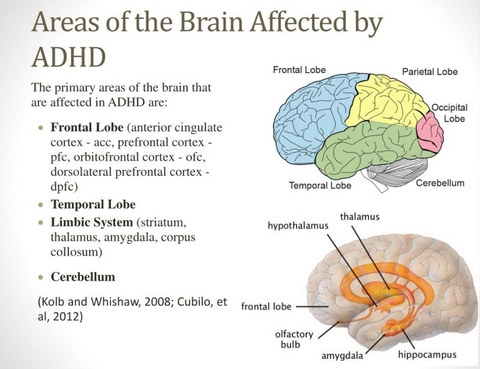Attention Deficit Hyperactivity Disorder (ADHD) is a multifaceted neurodevelopmental condition that affects individuals of all ages. From its symptoms and potential causes to available treatments and emerging complementary approaches like Lion's Mane Mushroom, understanding ADHD in its entirety is crucial for effective management and support.

Understanding ADHD
ADHD is a neurodevelopmental disorder characterised by a persistent pattern of inattention, hyperactivity, and impulsivity that significantly impairs functioning and quality of life. It affects both children and adults, with symptoms often manifesting in childhood and persisting into adolescence and adulthood. ADHD can impact various domains of life, including academic and occupational performance, relationships, and emotional well-being.
Symptoms of ADHD
Inattention
Hyperactivity
Excessive talking and a sense of being on the go are typical characteristics of hyperactivity in ADHD.
Impulsivity

Reference: https://www.slideserve.com/swann/areas-of-the-brain-affected-by-adhd
Exploring the Causes of ADHD
Understanding the underlying causes of ADHD involves considering various factors, including genetic, neurobiological, environmental, and psychosocial influences:
Treatment Approaches for ADHD
Managing ADHD typically involves a multimodal approach tailored to individual needs, preferences, and symptom severity:
Behavioural Therapy
Medication
Educational and Workplace Accommodations
Parental and Peer Support
Lion's Mane Mushroom: A Potential Adjunctive Therapy for ADHD?
Lion's Mane Mushroom (Hericium erinaceus) is a unique fungus revered for its potential cognitive and neurological benefits. Traditionally used in Asian cuisine and herbal medicine, Lion's Mane Mushroom has gained popularity in recent years for its purported role in supporting brain health and cognitive function.
While research on Lion's Mane Mushroom's specific effects on ADHD is still emerging, its neuroprotective and cognitive-enhancing properties suggest potential benefits for individuals with ADHD.

Benefits of Lion's Mane Mushroom
Cognitive Enhancement
Lion's Mane Mushroom has been studied for its potential to enhance cognitive function, including memory, attention, and executive function. Some research suggests that Lion's Mane Mushroom may support neuroplasticity, the brain's ability to reorganise and form new neural connections, which could benefit individuals with ADHD.
Neuroprotection
Bioactive compounds in Lion's Mane Mushroom, such as hericenones and erinacines, exhibit neuroprotective effects, safeguarding neurons from damage caused by oxidative stress and inflammation.
Neuroregeneration
Some research suggests that Lion's Mane Mushroom may stimulate nerve growth factor (NGF) production, promoting neuroregeneration and synaptic plasticity in the brain. This could potentially support the development of neural circuits involved in attention, impulse control, and executive function, which are impaired in individuals with ADHD.
Functions of Bioactive Compounds in Lion's Mane Mushroom
Hericenones
Hericenones are aromatic compounds found in Lion's Mane Mushroom known for their neuroprotective and anti-inflammatory properties. They may help protect neurons from damage and reduce inflammation in the brain, which could benefit individuals with ADHD.
Erinacines
Erinacines are bioactive compounds with potential neuroregenerative effects, promoting the growth and differentiation of nerve cells. By stimulating nerve growth and repair, erinacines may support cognitive function and neural plasticity in individuals with ADHD.
Beta-Glucans
Lion's Mane Mushroom contains beta-glucans, polysaccharides known for their immunomodulatory properties and potential cognitive benefits. Beta-glucans may help regulate immune function and reduce inflammation in the brain, which could indirectly support cognitive function and mood regulation in individuals with ADHD.
Read more on Lion’s Mane Mushroom and their benefits here
Dosage Recommendation
Adding functional mushrooms to your diet is easier than you might think. Here are some simple ways to incorporate this superfood into your daily routine:
- Baseline Dose: Start with 2 capsules or 1 gram per day for general wellness. This helps you experience the foundational benefits of the mushrooms.
-
Enhanced Dose: For more pronounced effects, please get in touch with us. Our team can help you determine the best approach for your needs.
Choosing the Right Mushroom Supplement
With so many mushroom supplements on the market, it's important to choose a high-quality product. Here are some tips to help you make an informed decision:
Conclusion
ADHD is a multifaceted condition that necessitates a holistic approach to diagnosis and management. By understanding its symptoms, causes, and treatment options, we can empower individuals with ADHD to lead fulfilling lives.
Additionally, emerging complementary therapies like Lion's Mane Mushroom offer exciting avenues for further exploration and potential adjunctive support in ADHD management.
As research continues to elucidate the role of Lion's Mane Mushroom in neurological health, integrating evidence-based practices with innovative approaches holds promise for enhancing outcomes and promoting well-being in individuals with ADHD.
If you suspect that you or someone you know may have ADHD, seek professional evaluation and support to embark on a journey toward effective symptom management and holistic well-being.
Disclaimer: It's important to include a disclaimer stating that the information provided is for informational purposes only and should not be construed as medical advice. Always consult with a licensed physician or qualified healthcare professional before starting any new treatments or supplements, particularly if you have any underlying health conditions or are taking medications.
References
Shaw, P., Eckstrand, M., Sharp, W., Blumenthal, J., Wallace, E., & Leroupt, M. (2006). Structural and functional abnormalities in the frontal cortex of young adults with attention-deficit/hyperactivity disorder. Biological Psychiatry, 59(10), 942-949. https://pubmed.ncbi.nlm.nih.gov/18024590/
Barkley, R. A. (2006). Attention-deficit hyperactivity disorder (ADHD): A handbook for diagnosis and treatment (3rd ed.). Guilford Publications.
Treatment Approaches for ADHD
Treatment of ADHD. (2023, November 10). National Institute of Mental Health. https://www.nimh.nih.gov/health/topics/attention-deficit-hyperactivity-disorder-adhd
Subcommittee on Attention-Deficit/Hyperactivity Disorder, Steering Committee on Quality Improvement and Management, American Academy of Pediatrics. (2011). Clinical practice guideline for the diagnosis, evaluation, and treatment of attention-deficit/hyperactivity disorder in children and adolescents. Pediatrics, 128(5), e1074-e1146. https://publications.aap.org/pediatrics/article/144/4/e20192528/81590/Clinical-Practice-Guideline-for-the-Diagnosis
Lion's Mane Mushroom and ADHD
Lion's Mane Mushroom and Its Effects on Cognitive Function, Inflammation, and Other Health Aspects. (2022, December 23). National Institutes of Health. https://pubmed.ncbi.nlm.nih.gov/24266378/





Hinterlasse einen Kommentar
Alle Kommentare werden vor der Veröffentlichung geprüft.
Diese Website ist durch hCaptcha geschützt und es gelten die allgemeinen Geschäftsbedingungen und Datenschutzbestimmungen von hCaptcha.